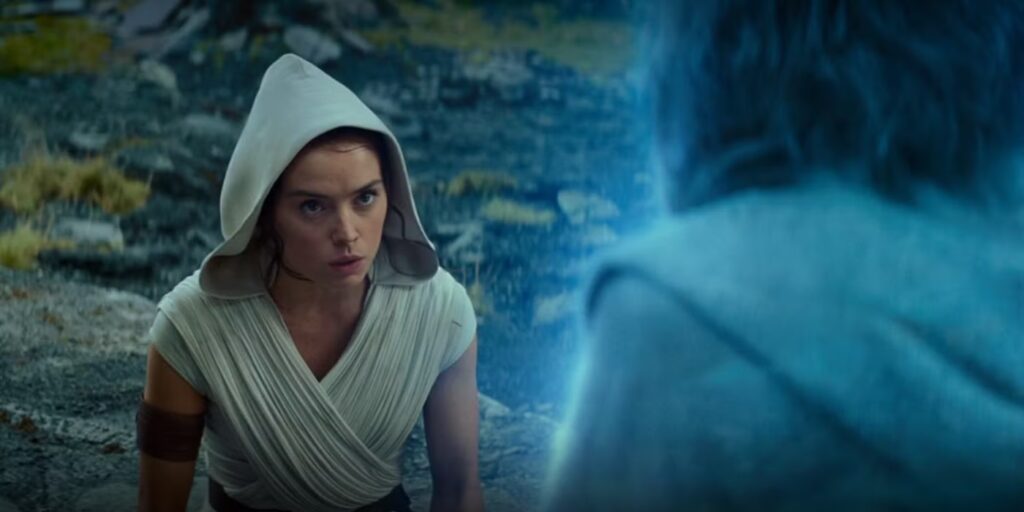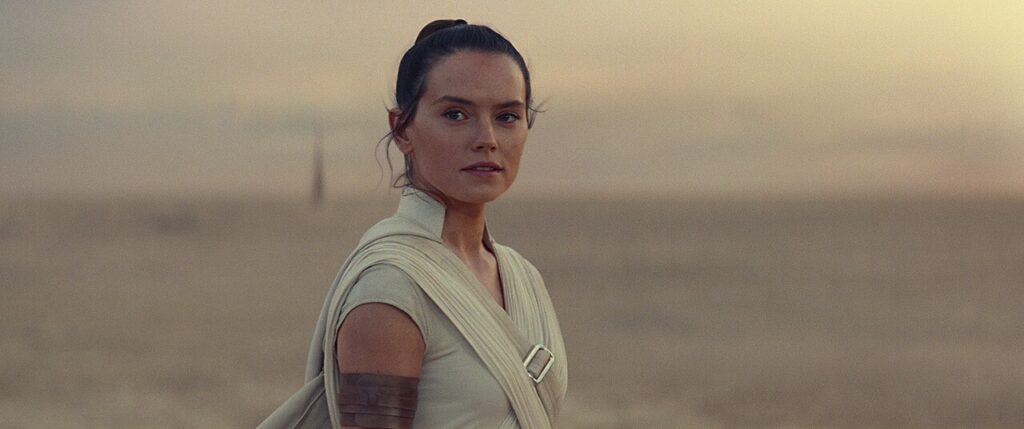In the final act of J.J. Abrams’ “Star Wars: The Rise of Skywalker,” Rey (Daisy Ridley) emulates Luke Skywalker (Mark Hamill) by exiling herself to the aquatic planet Ahch-To—but he doesn’t want her to.
“I was wrong,” Luke tells Rey gravely. “It was fear that kept me here. What are you most afraid of?”
When Abrams and co-writer Chris Terrio wrote those words, they could not foresee that soon after the film was released, we would all be exiled to our own personal islands. That we would live in fear of a pandemic more frightening than any Dark Lord of the Sith.
To most “Star Wars” fans, “The Rise of Skywalker”—which was released five years ago this month—is a compendium of clunky lines (“They fly now,” “Somehow, Palpatine returned,” et al). To me, the film will always be a welcome diversion from a desperate time.
I first saw “Skywalker” on December 20, 2019, at the Bagdad Theater in Portland. Afterward, me and my colleagues at T.H.O. Movie Reviews—Maxwell Meyers, Morgan Shaunette, and Geoff Wallace—crammed into Maxwell’s car to record a heat-of-the-moment podcast about the movie.
“It can’t help feeling like a tacked-on ending to a story that was already done,” I griped. “We already saw Emperor Palpatine defeated.” “He was just mostly dead,” Morgan joked. Within a year, T.H.O. would be mostly dead, too.
For all my fanboy-ish protestations, I still went to see “Skywalker” in theaters again. I mean, it was “Star Wars”! Lightsabers-the-Millenium-Falcon-the-Force “Star Wars”! As a film critic, I knew the film stank like Jabba the Hutt’s saliva. As a fan, I was grateful for each new trip to the galaxy far, far away, however imperfect.
My gratitude deepened as the terror and monotony of quarantine took hold. I swiftly lost count of how many times I rewatched “Skywalker,” clinging to its most hopeful moments as if they were life-saving escape pods (like the scene where Keri Russell’s Zorii Bliss says, “They win by making you think you’re alone. Remember? There’s more of us”).
That being said, I later realized that another J.J. Abrams-directed space opera, “Star Trek” (2009), was even more applicable to the cruelty that COVID-19, aggravated by America’s feckless 45th president, inflicted upon America and the world.
In “Star Trek,” a wormhole triggers “an entire new chain of incidents that cannot be anticipated.” “Whatever our lives might have been, if the time continuum was disrupted, our destinies have changed,” Spock (Zachary Quinto) says with finality. Alternate reality becomes reality.

Some days, it feels like we’re living in an alternate reality. I wonder if somewhere in the multiverse, there’s a life with no pandemic—a ghost life where we all pursued different jobs, found different friends, fell in love with different people.
Interestingly, a ghost of “The Rise of Skywalker” exists as well. Before he was fired and replaced by Abrams, director Colin Trevorrow co-wrote a very different version of the film titled “Duel of the Fates,” which became a fan fixation when the screenplay was leaked online.
During quarantine, I hosted a virtual reading of “Duel of the Fates,” to which much of the T.H.O. gang valiantly lent their voices (Morgan was Finn, Jor, and Obi-Wan; Maxwell pulled pentuple duty as Kylo, Vonn, Nomi, command intercom, and weapons operator).
That reading remains one of my brightest memories of those dark days. Yet as a film, “Duel of the Fates” never made it beyond the page; it is as nonexistent as the lives we might have lived if not for the pandemic. It was “The Rise of Skywalker” that became our reality, just like COVID-19.
In “Skywalker,” Resistance leader Poe Dameron (Oscar Isaac) is forced to acknowledge that his troops are dwarfed by the First Order’s fascist legions. “How’d you do it, defeat an empire with almost nothing?” Poe asks “Star Wars” veteran Lando Calrissian (Billy Dee Williams).
“We had each other,” Lando says gently but firmly. “That’s how we won.”
I know what he means. During the pandemic, I was about as lucky as a human being could be. I had my family and I had my friends—and I had a movie that roused me when I needed to be roused, despite its cosmic messiness.
After she flies to Ahch-To, Rey burns her starship, believing isolation is the only answer to the visions she’s had of herself turning to the dark side. “I saw myself on the dark throne,” she tells Luke. “I won’t let it happen. I’m never leaving this place.”
“If you don’t face Palpatine, it will mean the end of the Jedi,” Luke replies. “And the war will be lost.”
Even after Luke persuades Rey to return to the frontlines, she doubts that she will triumph. So Luke smiles and tells her what she has to hear: “You have everything you need.”



